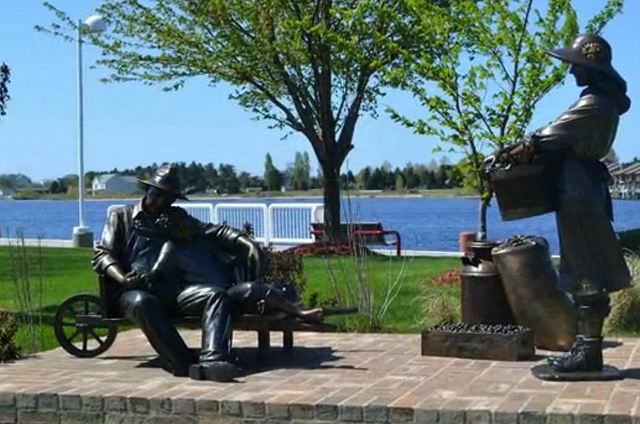Time to be thankful for farmers' husbandry of Michigan water
This is a bit of a different take on a Thanksgiving column. While I appreciate the writers who inspire us to pause, reflect and be thankful for all we have, the good food of the holiday is a close second in my Thanksgiving thoughts.
I love the recipes and special dishes, but this week, I reflect on where all this food comes from. I think about farming in this state and region, and conclude once again that I am incredibly thankful to live near the Great Lakes.
The first reason to be thankful (and proud) is Michigan’s diversity in food production – we are second only to California in the array of crops that we grow here. Yet in a world where population growth will require a doubling of food production by 2050, we all should be concerned about how this growing demand will affect the quality of our lands and waters.
Detroit Public Television and The Nature Conservancy have been co-producing a series called Great Lakes Now, and last week’s segment was on farming and freshwater. The panelists gave me a deeper appreciation of the complexity of issues that lie behind the food on my Thanksgiving table.
At the same time, it is inspiring to learn of the extensive collaboration among farmers, agricultural researchers, producers, processors and conservationists to develop innovative tools, methods and models to improve farming practices and reduce the negative impact of farming on freshwater systems. This is something to be thankful for, for much is at stake when we live in the world’s largest freshwater system. Questions that need answers include:
What is the “right” amount of fertilizer and when, where and how should it be applied?
How much conservation is enough to assure water quality and health of our fisheries? What is the right placement of conservation practices to optimize a return on investment and assure watershed health?
How do we best manage drainage systems to minimize flooding and drought in the field, while also minimizing nutrient loss?
Can farmers make more money, produce better quality food and still improve the quality of our environment?
The answers are emerging from initiatives, pilots and demonstrations that are underway across the region, efforts we all should be more informed about as residents of the Great Lakes states, and to better understand what is behind the food at our table.
An article published by Conservation Magazine provides insight on efforts underway in Green Bay, Wisconsin, highlighting efforts to understand how to implement best farming practices with greater precision to achieve tangible outcomes to improve water quality. Farm supply companies like the Andersons are partnering with conservation organizations to lead a “4R” Certification Program to improve Lake Erie conditions – focusing on the right source of phosphorous applied at the right rate at the right time in the right place. Universities are partnering with producers to test new cover cropping systems that can increase yield and decrease soil erosion.
Michigan State University is also working with conservation partners in develop new innovative tools that help farmers choose practices that will increase groundwater recharge and decreased sediment runoff. And private industry is developing solutions to more effectively manage the flow of water across and through the countryside in ag drainage systems, to reduce sediment runoff and improve water quality.
Across the region these stakeholders, our neighbors and friends are working on solutions, and while there is much work to be done, in this season of reflection and gratitude, when I realize my world is filled with good food and smart, caring organizations and leaders collaborating to find solutions to protect this truly beautiful place we live in, it is easy to be thankful.
See what new members are saying about why they donated to Bridge Michigan:
- “In order for this information to be accurate and unbiased it must be underwritten by its readers, not by special interests.” - Larry S.
- “Not many other media sources report on the topics Bridge does.” - Susan B.
- “Your journalism is outstanding and rare these days.” - Mark S.
If you want to ensure the future of nonpartisan, nonprofit Michigan journalism, please become a member today. You, too, will be asked why you donated and maybe we'll feature your quote next time!


 FRUITS OF FARMING: Michigan celebrates its agricultural richness in sculpture in Ludington, alongside what makes it possible – abundant freshwater. (Photo by Flickr user Michigan Municipal League; used under Creative Commons license)
FRUITS OF FARMING: Michigan celebrates its agricultural richness in sculpture in Ludington, alongside what makes it possible – abundant freshwater. (Photo by Flickr user Michigan Municipal League; used under Creative Commons license)